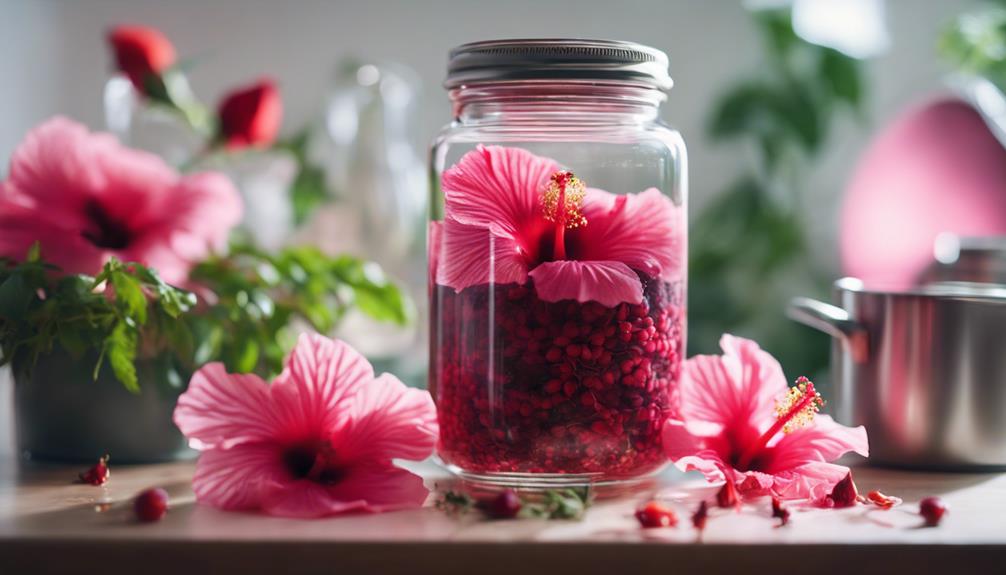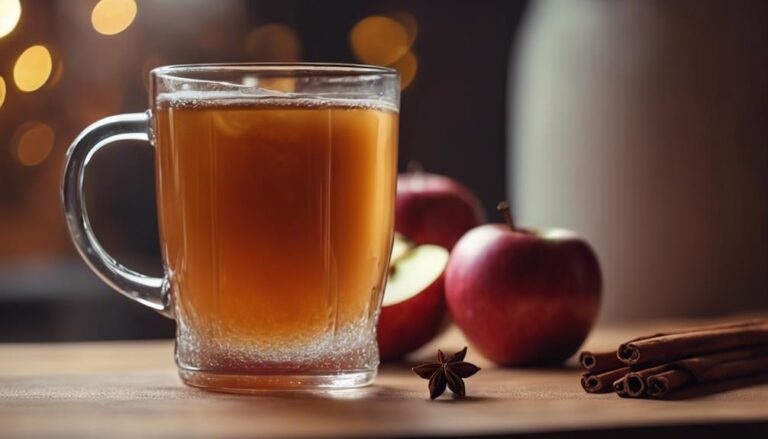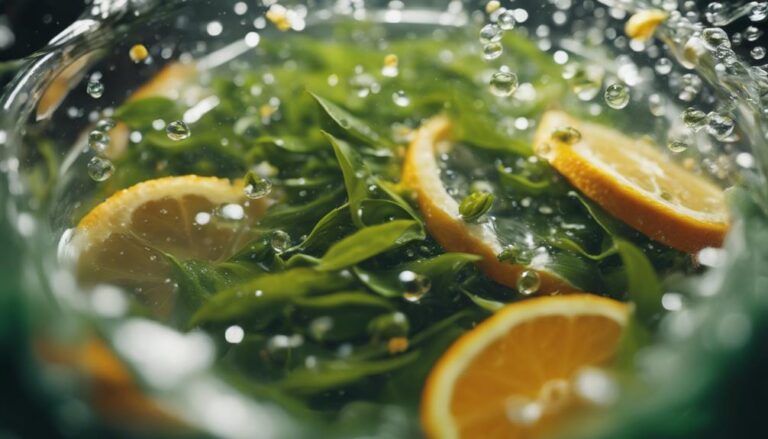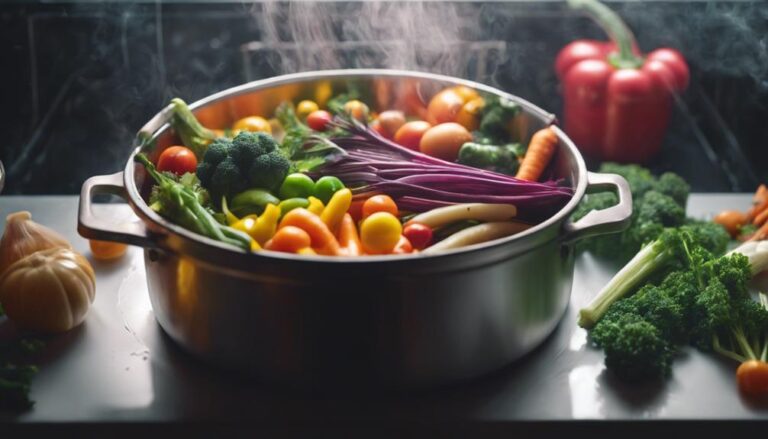Sous Vide Herbal Tea With Hibiscus and Rosehips
Enhance your herbal tea experience by preparing sous vide herbal tea with hibiscus and rosehips. Sous vide guarantees precise temperature control, extracting full flavors from the ingredients. The blend of hibiscus and rosehips creates a synergy rich in antioxidants and vitamins, perfect for boosting health benefits. The tartness of hibiscus complements the slightly sweet notes of rosehips, providing a flavorful and caffeine-free blend suitable for any time of day. This method assures a sophisticated and customizable tea experience, capturing the essence of the ingredients in a concentrated and aromatic infusion.
What You Will Learn Here
- Sous vide method enhances hibiscus and rosehips' flavors
- Precise temperature control ensures optimal extraction
- Retains delicate compounds and nutrients for a rich tea
- Customizable brewing for unique herbal tea experiences
- Captures essence of ingredients in concentrated, aromatic blend
Origin of Rosehips in Tea
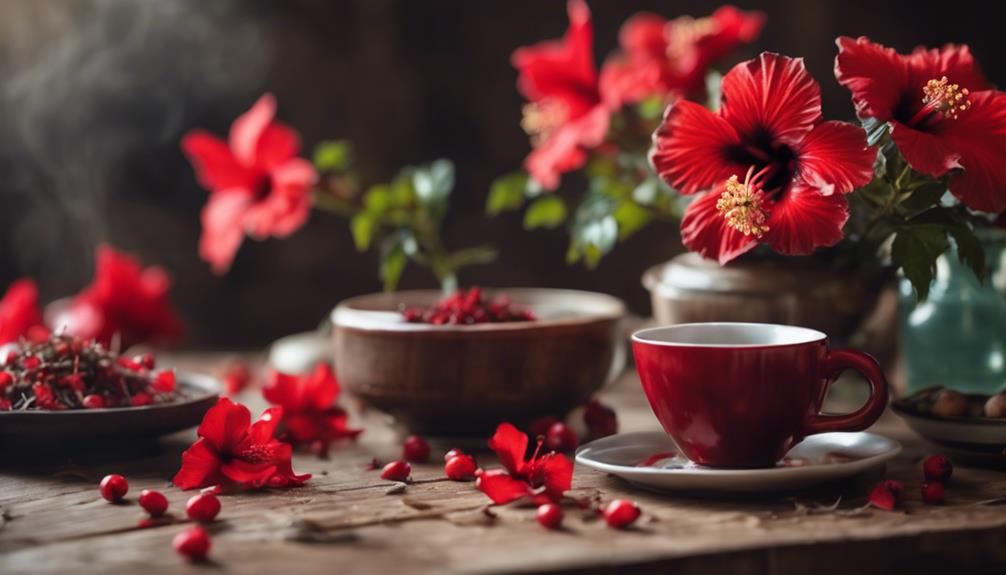
Rosehips, the fruit of the rose plant, bring a wealth of health benefits to herbal teas.
Understanding the origins of rosehips in tea provides insight into their historical significance and flavor profile.
Exploring the health advantages, historical context, and taste characteristics of rosehips is essential for appreciating their role in herbal tea blends.
Rosehips Health Benefits
How do the antioxidants found in rosehips contribute to the health benefits of herbal teas like hibiscus and rosehip tea?
Rosehips, rich in Vitamin C and other antioxidants, play an essential role in promoting health. These compounds possess anti-inflammatory properties, aiding in immune system enhancement.
When incorporated into teas like hibiscus and rosehip tea, rosehips can assist in weight management and skin health. Additionally, the antioxidants present in rosehips may lower the risk of chronic diseases such as cancer and heart disease.
Traditionally valued for their medicinal properties, rosehips are a popular addition to herbal teas like hibiscus and rosehip tea, offering a flavorful way to reap their numerous health benefits.
Rosehips Tea History
The historical integration of rosehips into tea can be traced back to ancient civilizations, particularly the Egyptians and Greeks, marking a longstanding tradition of incorporating these Vitamin C-rich fruits into herbal brews. Rose hips, the fruit of the rose plant, were valued for their high Vitamin C content and were commonly used in teas.
During World War II, when Vitamin C-rich foods were scarce, rosehips gained popularity as a natural remedy for colds and flu. The red to orange-colored rosehips have a tangy and fruity flavor profile, making rosehip tea a favorite among herbal tea enthusiasts.
This rich history highlights the enduring appeal and health benefits associated with the inclusion of rosehips in teas.
Rosehips Flavor Profile
When incorporating rosehips into herbal teas, their tart and slightly sweet flavor profile complements the overall taste experience, especially in blends like hibiscus tea.
Rosehips, the fruit of the rose plant, are rich in Vitamin C, contributing to the health benefits of teas.
The flavor profile of rosehips is earthy, with subtle hints of floral notes, adding depth to the tea blend.
Due to their unique taste, rosehips are commonly used in teas to enhance flavor and nutritional value.
Rosehip and Hibiscus Synergy
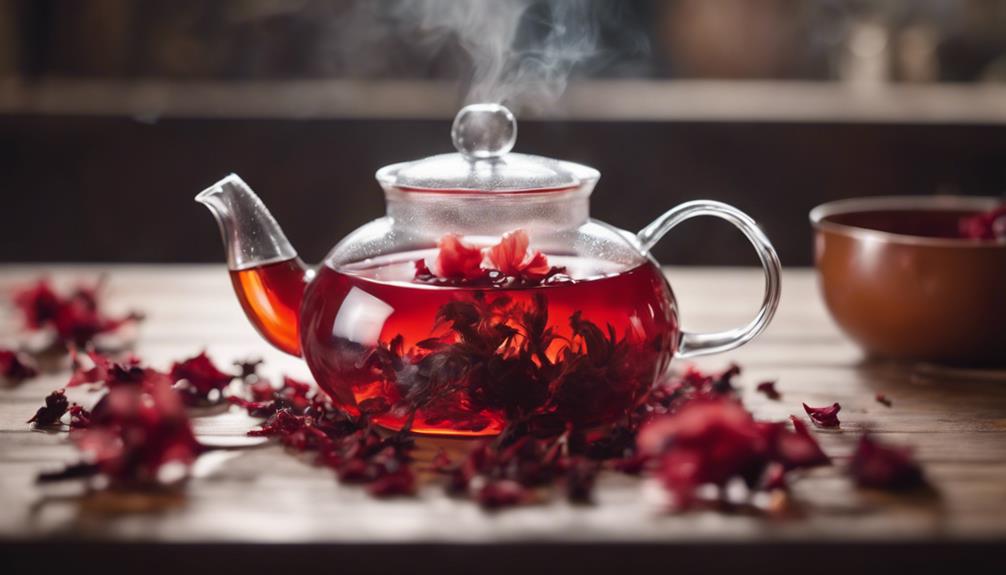
Combining rosehips and hibiscus in your herbal tea blend enhances its antioxidant and vitamin content. The synergy between these two ingredients offers a delightful fusion of flavors and health benefits. Here's how the rosehip and hibiscus work together in your tea:
- Essential Power: Rosehips are packed with vitamin C, while hibiscus boasts a range of antioxidants. Together, they create a potent blend that helps combat free radicals in your body.
- Crucial Boost: The combination of rosehips and hibiscus provides a rich source of vitamins, including vitamin A and vitamin C, essential for immune support and overall well-being.
- Tart and Sweet: Blending the tartness of hibiscus with the slightly sweet notes of rosehips results in a balanced and flavorful concoction that tantalizes your taste buds.
- Caffeine-Free Delight: Enjoy this tea any time of day, as both rosehips and hibiscus are naturally caffeine-free, allowing you to savor its benefits without worrying about sleep disruptions.
Rosehip Tea Infusion Variations
When exploring Rosehip Tea Infusion Variations, consider trying combinations like Rosehip Tea With Lemon Zest, Lemon-Infused Rosehip Tea, or Hibiscus-Rosehip Tea With Mint.
These variations can offer a range of flavors that complement the natural tartness of rosehips. Experimenting with different ingredients can lead to unique and personalized herbal tea blends.
Rosehip Tea With Lemon Zest
To infuse rosehip tea with a invigorating citrusy twist, consider incorporating lemon zest for an enhanced flavor profile and increased Vitamin C content. The addition of lemon zest to rosehip tea creates a revitalizing and aromatic beverage.
Here's how to make Rosehip Tea with Lemon Zest:
- Preparation: Gather dried rosehips and organic lemon.
- Ingredients: Combine rosehips with lemon zest in hot water.
- Steeping: Let the mixture steep for 5-10 minutes to extract flavors.
- Enjoy: Strain the tea, pour into a cup, and savor the zesty, vitamin-rich goodness of Rosehip Tea with Lemon Zest.
Lemon-Infused Rosehip Tea
For a lively twist on traditional rosehip tea, enhance the flavors with a zesty infusion of lemon. The lemon-infused rosehip tea offers an invigorating citrus kick that complements the floral and fruity notes of the rosehips. Here's how to enjoy this revitalizing beverage:
- Vitamin C Boost: The combination of lemon and rosehips provides a potent dose of Vitamin C, supporting immunity and skin health.
- Antioxidant Power: Lemon enhances the antioxidant properties of rosehips, aiding in the fight against oxidative stress and inflammation.
- Balanced Flavor Profile: The zesty lemon flavor harmonizes with the slightly tart and tangy characteristics of rosehips, creating a well-balanced tea.
- Versatile Enjoyment: Whether served hot or cold, lemon-infused rosehip tea offers a versatile and flavorful option for any time of day.
Hibiscus-Rosehip Tea With Mint
Elevate your herbal tea experience with the invigorating and flavorful blend of hibiscus, rosehip, and mint.
- Hibiscus flowers provide a tangy and vibrant base.
- Rosehips add a sweet and slightly tart undertone.
- Mint contributes a revitalizing and cooling essence.
- The combination results in a harmonious blend of fruity, floral, and minty notes, creating a unique and aromatic tea experience.
This rejuvenating hibiscus-rosehip tea with mint can be enjoyed both hot and cold. Rich in antioxidants, this herbal infusion offers a delightful sensory journey with every sip.
Embrace the invigorating flavors of hibiscus, the sweetness of rosehips, and the cooling touch of mint in this delightful herbal tea blend.
Enhancing Tea Flavor Profile
To enhance the flavor profile of your herbal tea, consider experimenting with flavor infusion techniques like adding citrus fruits or fresh herbs for an invigorating twist.
Aromatics such as spices like cinnamon or ginger can bring complexity and depth to the taste of the tea.
Controlling the temperature precisely during the sous vide process can help extract the best flavors from the ingredients used.
Flavor Infusion Techniques
Enhance the flavor profile of your herbal tea infusion by incorporating hibiscus flowers and rosehips using the sous vide technique for precise flavor extraction. Sous vide technology allows for meticulous temperature regulation, ensuring the ideal extraction of flavors from the hibiscus and rosehips.
Through the gentle and consistent heat distribution of sous vide, a full spectrum of flavors is coaxed out of these ingredients. This method effectively retains the delicate aromas and essential compounds present in the tea, resulting in a more robust and aromatic brew.
Aromatics for Complexity
For invigorating depth in your herbal tea flavor profile, consider incorporating aromatic elements like hibiscus and rosehips to achieve a well-balanced and complex brew.
Hibiscus, known for its tart and tangy notes, pairs harmoniously with the slightly sweet and floral aroma of rosehips. This combination creates a robust and flavorful herbal tea blend that tantalizes the palate.
Not only do hibiscus and rosehips enhance the taste profile, but they also bring a wealth of antioxidants and vitamins, boosting the health benefits of your tea.
Tea enthusiasts seeking a rejuvenating and unique flavor experience will appreciate the rich complexity that hibiscus and rosehips offer when infused into their brew. Experiment with these aromatics to elevate your tea-drinking experience.
Temperature Control Benefits
Considering the meticulous extraction of flavors required for a well-balanced herbal tea, precise temperature control through sous vide methodology becomes essential in accentuating the nuances of hibiscus and rosehips.
When brewing herbal tea with hot water, maintaining a consistent temperature is vital for extracting the desired flavors without causing degradation.
With sous vide, you can set the perfect temperature, ensuring that the delicate compounds in hibiscus and rosehips are preserved. This method allows you to customize the brewing temperature to bring out specific nuances and aromas, resulting in a more harmonious blend of flavors.
Final Thoughts
In conclusion, the sous vide herbal tea recipe with hibiscus and rosehips offers a sophisticated and customizable tea-making method that elevates the infusion process. The hot sous vide water bath guarantees precise temperature control, allowing the hibiscus and rosehips to release their full flavor potential without the risk of over-extraction or scorching.
By using the sous vide technique, you can achieve a concentrated and aromatic herbal tea that captures the essence of the ingredients in a way that traditional brewing methods may struggle to replicate. Additionally, the flexibility of this method enables you to experiment with different flavor combinations by adding ingredients like lemon, honey, or spices, tailoring the tea to your preferences.
The gentle sous vide process also helps retain the delicate flavors and nutrients of the hibiscus and rosehips, resulting in a high-quality tea experience that's both flavorful and nourishing. Embrace the freedom to create your perfect cup of herbal tea with the sous vide approach.
Frequently Asked Questions
What Does Rosehip and Hibiscus Tea Do?
Rosehip and hibiscus tea provide a myriad of health benefits, such as supporting immune function, aiding in weight management, and promoting heart health. Regular consumption can enhance your overall well-being and offer a caffeine-free, flavorful beverage option.
What Not to Mix With Hibiscus Tea?
Avoid mixing hibiscus tea with dairy or alcohol when preparing hibiscus cocktails. Opt for citrus fruits like lemon or orange, spices such as cinnamon or ginger, and sweeteners like honey for balanced flavors to complement hibiscus tea.
What Are the Side Effects of Rose Hips Hibiscus Tea?
You may experience side effects from rose hips and hibiscus tea, including potential allergies. It's important to be mindful of stomach discomfort, diarrhea, and the risk of kidney stones from high oxalate levels. Consult a healthcare provider if needed.
Who Should Not Drink Rosehip Tea?
If you're pregnant, it's crucial to avoid rosehip tea due to potential risks. Discuss with your healthcare provider before consuming. Keep in mind, individuals on blood thinners, those with kidney stone history, allergy to Rosaceae plants, infants, and young children should steer clear.
Conclusion
To wrap up, the sous vide herbal tea with hibiscus and rosehips offers a unique and flavorful infusion that highlights the natural benefits of these ingredients.
The synergy between rosehips and hibiscus creates a harmonious blend that can be easily customized to suit individual preferences.
By experimenting with different infusion variations and techniques, one can enhance the flavor profile of the tea and enjoy a soothing and aromatic beverage.
Cheers to a delightful tea experience!
